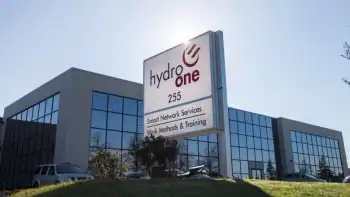DEP delays action on plant's fish kills
The Waterford plant sucks in more than 2 billion gallons of water to cool the reactors each day, killing billions of young fish, before pouring the heated water back into the Sound. As a condition for renewing the long-expired permit that allows Millstone to do that, the state considered forcing the plant's operator, Dominion, to take a step environmentalists say is critical - installing a system that would recycle the cooling water, cutting water use by 90 percent.
Dominion would have had until 2009 to figure out how to do that. But after further discussions with Dominion, the DEP changed course.
It agreed to allow Dominion more time to study other technologies that could alleviate the problem. The revised permit, still subject to final approval, would give Dominion until 2012 to settle on a solution - a turnaround that has left environmental groups fuming. Meanwhile, the new permit would allow Millstone to continue pumping billions of gallons of water from Niantic Bay to cool its two operating reactors - about enough to fill 110,000 swimming pools a day.
"I'm perplexed why we're here after 14 years of feasibility studies," complained Roger Reynolds of the Connecticut Fund for the Environment.
He accused Dominion of "trying to stretch this out as long as possible." State Rep. Terry Backer of Stratford, who also heads Soundkeeper, a nonprofit environmental advocacy group, said the proposal relies on measures "that are too little, too late, and riddled with loopholes and escape hatches."
Critics say the Millstone episode is indicative of a broader problem within the Department of Environmental Protection - a tendency to prefer compromise over enforcement, even when faced with repeated violations and years of delay. Pressure is growing among environmentalists and lawmakers for the agency to get tougher with polluters.
"We're talking about an agency that needs to be re-examined and strengthened," said state Sen. Edward Meyer, D-Guilford, newly appointed Senate chairman of the environment committee. "Right now it's dysfunctional." DEP officials say they had good reason to reconsider their approach to Millstone's wastewater discharge permit.
Oswald Inglese, director of the DEP's water permitting and enforcement division, said the earlier version of the permit was so unequivocal that it could have left the state open to challenges by Dominion - which ultimately could have further delayed an solutions. The September document stated outright that a "closed-cycle recirculating system," which would allow Millstone to recycle most of the cooling water it uses, is the "best available technology" for reducing the plant's impact on the environment.
The document declares that, under federal law, that's what Dominion would have to install - unless it can find a comparable solution. But, Inglese said, Dominion argued during discussions with the agency that it has not yet figured out whether such a system can actually be installed at Millstone. And, Dominion said, the company needed three more years to figure that out. The permit proposed in December gives Dominion more leeway, and more time.
"We want them to do the analysis and see what can be installed - clear, unequivocal - and find out what actually can be built at Millstone that would minimize impacts to the greatest extent," Inglese said.
He said the new permit sets a firm deadline and will force Millstone to solve the problem.
Winter flounder used to be a commercially viable species in Long Island Sound, but for various reasons - overfishing, habitat loss, predation by other fish, pollution, warmer water - stocks are so low some fear the fish may never recover. The decline is more marked in the Niantic Bay area, and the DEP and others have concluded that Millstone plays a significant role.
A spokesman for Dominion said that the flounder is in trouble all along the Atlantic seaboard, and that it is unclear what role Millstone plays in its demise.
Experts estimate that the water intake at Millstone kills billions of young fish and larvae every year, as they are caught in filtering screens or sucked into the plant's cooling system. The warmer water the plant discharges into the Sound is a less significant issue than the intake, the DEP says. But a general warming trend in the Sound is threatening cold water species such as the winter flounder, lobsters and others.
Environmentalists insist that the DEP and Dominion already know how to fix the problem: Install the closed-cycle cooling system, which would reduce the inflow to a couple of hundred million gallons of water a day.
Such systems use cooling ponds or canals, or cooling towers that act like huge radiators, taking in heated water from the plant, letting off steam and lowering the temperature so it can be reused. Under the federal Clean Water Act, Millstone needs a wastewater discharge permit from the state in order for the plant to dump its used cooling water back into the Sound.
Environmentalists have been pushing the DEP to make the closed-cycle system a condition of that permit. Inglese said that such systems have been "on the table" for 30 years, but that action has been stalled by shifting federal requirements.
For Millstone to do anything else but install the recycling system, environmentalists argue, would violate the federal Clean Water Act, which requires facilities to use the "best available technology" to avoid pollution.
That's where the DEP appeared to be headed in September 2007 when the agency shared its proposed permit language with Dominion and others, including environmental groups.
"We want to understand the issues" the parties might have, Inglese said. "We may agree to disagree, but it is part of the process." Dominion officials argued that they did not know whether a closed-cycle cooling system could be installed at Millstone, and therefore questioned whether such a system is indeed "the best available technology" required by law.
"They also listed a litany of reasons why it may not be able to be implemented," Inglese said. Among those were nuclear safety issues, the height of the cooling towers, fogging issues, the disruption of bird migration and the question of whether there was room on the site. As a result, DEP staff redrew the permit language.
In the new version, Dominion would be required to study closed-cycle cooling and any other technology that could achieve a 90 percent reduction in water flow. It also must look at other measures that could get as close to that goal as possible, in the event a 90 percent solution wouldn't work.
"We're still setting the same bar in terms of what we expect," Inglese said. "The September and December versions accomplish the same thing." Pete Hyde, a spokesman for Dominion, said it is unclear whether a closed-cycle system is the best way to help the flounder. The technology has changed, he said, and alternatives are worth another look.
"It's convenient to say just do closed-cycle cooling," he said. "But it may not have the intended effect, and it may not be the best technology."
Dominion has already agreed to install special water pumps that would allow the plant to slow the water flow and reduce the impact on the fish, and to schedule routine shutdowns during the winter flounder spring spawning season.
The company also will look at the use of fine mesh screens that could reduce fish mortality. The draft permit requires the company to look into restocking as another way to rebuild the flounder population.
"Studying the best available technology is going to take some time," Hyde said.
Reynolds and Backer say Millstone has already taken plenty of time. The plant's owners, they say, completed two feasibility studies, in 1993 and 2001, that concluded that a closed-cycle system could be used. The cost to retrofit a nuclear plant with such a system could run into hundreds of millions of dollars, according to EPA data.
Backer said that while the state may be well-intentioned, the proposed permit would let Dominion drag its feet and continue studying the issue without any deadline.
"They know that closed-cycle cooling is the best available technology, and we want them to declare that the best available technology and move forward," Backer said. The DEP's decision to give Dominion more options - and more time - "substantially weakened the permit," Reynolds said. Inglese disagreed with that assessment and said the earlier studies were incomplete.
"The two studies in question were not comprehensive enough to know if it can be done," he said. "We don't have enough information to make that determination.
"Other parties may argue that (2012 is) way too long for them to do this study," he added. "To the extent they can show it can be done earlier, we would not oppose that. We'd favor any shorter schedule to get the analysis done."
A public hearing on the permit is scheduled to begin June 17.
Hyde, the Dominion spokesman, said the company's new studies will be based on "new and evolving technology." He could not, however, identify any specific new technology that might have cropped up since the 2001 feasibility study on closed-cycle cooling.
But, he said, "there are multiple different designs that could be considered."
Millstone has been operating for more than a decade under an expired wastewater discharge permit, which critics point to as just one example of how the DEP is failing to do its job. Meyer said he wants to review all 108 companies with permits to discharge into state waters, after reports in The Courant that many companies are exceeding their allowable pollution limits, and that several are operating, like Millstone, with expired permits.
He also wants to see the agency's budget get a boost and said the DEP does not have enough staff to properly handle its permitting responsibilities.
"The legislature has been a partner with last two governors in decimating the DEP," he said. DEP spokesman Dennis Schain responded: "Yes, questions have been raised recently about DEP's ability to enforce conditions of various permits we issue. But neither Sen. Meyer nor anyone else involved has expressed serious reservations about the overall performance of this agency.
"Everyone appreciates the fact that DEP is working hard to protect the natural resources of this state and that we are making the best possible use of the resources we have. If additional resources are made available, we will also put them to good use and use them wisely."
Related News

Hydro One extends ban on electricity disconnections until further notice
TORONTO - Ontario's primary electricity provider says it's extending a ban on disconnecting homes from the power grid until further notice.
Hydro One first issued the ban towards the beginning of the province's COVID-19 outbreak, saying customers needed to be able to rely on electricity while they were kept at home during the pandemic.
A spokesman for the utility says the ban was initially set to expire at the end of July, but has now been extended without a fixed end-date.
Hydro One says the move is necessary given the ongoing restrictions posed by the pandemic, as well as persistent hot weather across…





